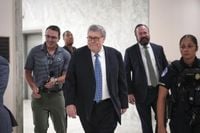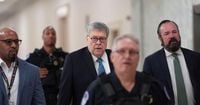On Monday, August 18, 2025, the halls of Capitol Hill buzzed with anticipation as former Attorney General Bill Barr arrived for a high-profile deposition before the House Oversight Committee. The subject? The ongoing mystery and controversy surrounding the late financier and convicted sex trafficker Jeffrey Epstein—whose death in federal custody nearly six years ago continues to ignite fierce debate and political intrigue.
Barr’s testimony was just the opening salvo in what promises to be a sweeping investigation. According to the panel’s chairman, Rep. James Comer of Kentucky, Barr shared "new" details about Epstein’s prosecution and the circumstances of his death in a Manhattan jail cell on August 10, 2019. Comer told reporters, "We asked a lot of questions about the, you know, the suicide," before noting that, despite the persistent rumors and conspiracy theories, the "general consensus" among Barr, FBI Director Kash Patel, independent medical experts, and federal investigators is that Epstein took his own life while awaiting trial on charges of sexually abusing underage girls.
Yet, even as the official narrative was reiterated, Comer expressed his own doubts. "I have no idea whether Epstein killed himself," he confessed, highlighting the "blind spots in the cameras" at the Metropolitan Correctional Center. "It’s unfortunate… there weren’t people in there watching because this is such a high-profile case. I’m very disappointed in the security." According to CBS 60 Minutes, these camera blind spots have long fueled public suspicion and frustration over the lack of definitive answers in the case.
The tension in the hearing room was palpable. Barr, who served as Attorney General during President Donald Trump’s first term and was in office when Epstein died, declined to comment to reporters before and after his deposition. During the closed-door session, Barr reportedly testified that he was unaware of any missing security footage from the jail, despite critics pointing out that a Department of Justice video released just last month was missing nearly three minutes of footage—an omission that has only deepened the sense of mystery for many observers.
Adding to the intrigue, Barr also addressed the persistent rumors of a so-called "client list"—a roster of powerful individuals allegedly implicated in Epstein’s criminal network. According to Comer, Barr affirmed the absence of any such list and denied ever discussing it with President Trump. Barr went further, suggesting that if Trump had been involved in Epstein’s activities, the Biden administration’s Justice Department "would’ve leaked any association." As Comer relayed to reporters, Barr "never had conversations with President Trump pertaining to a client list. He didn’t know anything about a client list. He said that he had never seen anything that would implicate President Trump in any of this."
The committee’s inquiry is not limited to Barr’s recollections. On the same day as Barr’s deposition, Comer announced that the Justice Department had agreed to begin turning over Epstein-related records to the Oversight Committee, starting Friday, August 22. This move came after the committee issued a subpoena with a deadline of August 19, pressing the DOJ for transparency on a case that continues to roil the House and the public alike. Comer acknowledged that the department was still compiling the requested records and might not meet the initial deadline, but he expressed optimism: "I expect to get them very soon."
"There are many records in DOJ’s custody, and it will take the Department time to produce all the records and ensure the identification of victims and any child sexual abuse material are redacted," Comer explained in a statement. "I appreciate the Trump Administration’s commitment to transparency and efforts to provide the American people with information about this matter."
The scope of the committee’s investigation is broad. In addition to Barr, nearly a dozen current and former federal officials have been subpoenaed for depositions—an extraordinary list that includes former President Bill Clinton, former Secretary of State Hillary Clinton, and attorneys general stretching from the Biden administration all the way back to George W. Bush. Attorney General Pam Bondi was also subpoenaed for records related to Epstein, his now-convicted accomplice Ghislaine Maxwell, and a controversial non-prosecution agreement from the mid-2000s, which was overseen by then-South Florida U.S. Attorney Alex Acosta. Acosta would later serve as Trump’s Labor Secretary.
Not everyone is convinced the investigation is as earnest as its Republican leaders claim. Democratic lawmakers have expressed skepticism, with Rep. Jasmine Crockett of Texas questioning the motives behind the renewed focus on Epstein after nearly five years of relative silence. "The question is if they are truly invested in doing what’s right and making sure that there’s real transparency for the American people," Crockett said, according to CNN. "Right now, it doesn’t seem like that. It seems like they are going through the motions and they want people to believe that they are digging in."
Rep. Suhas Subramanyam of Virginia echoed those concerns, suggesting that "the Democratic side is doing most of the heavy lifting. I don’t think we’re learning much from the questioning from the House Republicans. It doesn’t seem like this is something where they are truly caring about the victims and about trying to get to the bottom of what’s happening."
Comer, for his part, has pushed back against any suggestion that the probe is politically motivated. "This is a serious investigation. This is a sincere investigation. I hope this will be a bipartisan investigation. I would encourage my Democrat colleagues not to politicize this." Still, the political undercurrents are impossible to ignore. As Rep. Crockett pointed out, "This is a promise, I will tell you, that was not made by Kamala Harris. It’s not a promise that was made by Joe Biden. This was a promise that was made by Donald Trump." Democrats have suggested that the renewed attention on Epstein is, at least in part, an attempt by Republicans to fulfill campaign promises and perhaps distract from other political controversies.
Meanwhile, House Speaker Mike Johnson has delayed a vote on publicly releasing the DOJ’s Epstein files until September, saying that while he supports transparency, he wants to give the administration time to handle the matter appropriately. According to CNN, the Republican-led panel has also subpoenaed nine other individuals for private depositions between August and mid-October, including former Attorneys General Merrick Garland, Jeff Sessions, Loretta Lynch, Eric Holder, and Alberto Gonzales; former FBI Director James Comey; former special counsel and FBI Director Robert Mueller III; Hillary Clinton; and Bill Clinton.
As the committee prepares to pore over a mountain of documents and question a who’s who of American political power, one thing seems certain: the death of Jeffrey Epstein, and the secrets it may still conceal, will remain in the public eye for months to come. For those seeking answers, the coming weeks promise both revelations and, inevitably, more questions.






